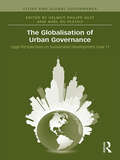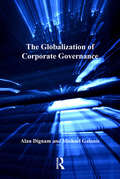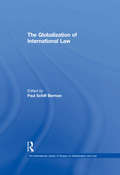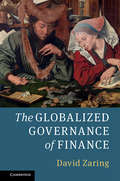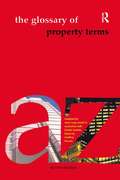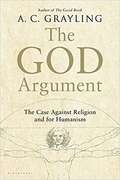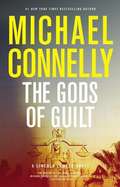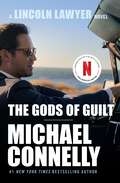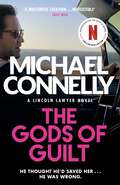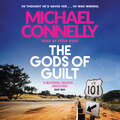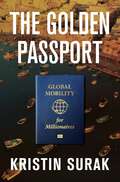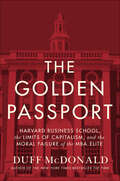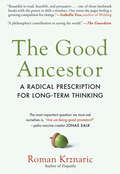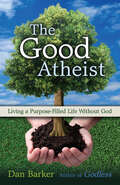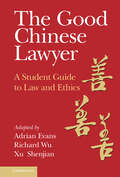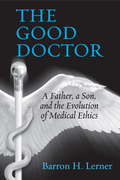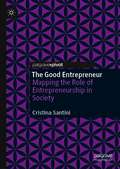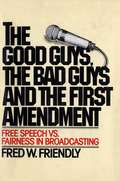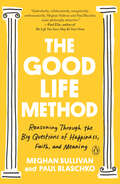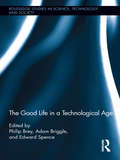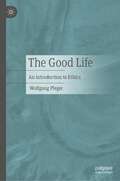- Table View
- List View
The Globalisation of Urban Governance: Legal Perspectives On Sustainable Development Goal 11 (Cities and Global Governance)
by Helmut Philipp Aust Anél Du PlessisThe adoption of the Sustainable Development Goals (SDGs) by the UN General Assembly in 2015 represents the latest attempt by the international community to live up to the challenges of a planet that is out of control. Sustainable Development Goal 11 envisages inclusive, safe, resilient and sustainable cities around the world by the year 2030. This globally agreed vision is part of a trend in international policy toward good urban governance, and now awaits implementation. Fourteen original contributions collectively examine how this global vision has been developed on a conceptual level, how it plays out in various areas of (global) urban governance and how it is implemented in varying local contexts. The overarching hypothesis presented herein is that SDG 11 proves that local governance is recognised as an autonomous yet interrelated part of the global pursuit of sustainable development. The volume analyses three core questions: How have the normative ideals set forth in SDG 11 been developed? What are the meanings of the four sub-goals of SDG 11 and how do these relate to each other? What does SDG 11 imply for urban law and governance in the domestic context and how are local processes of urban governance internationalised? The Globalisation of Urban Governance makes an important scholarly contribution by linking the narrative on globalisation of good urban governance in various social sciences with legal discourse. It considers global governance and connects the existing debate about cities and their place in global governance with some of the most pertinent questions that lawyers face today.
The Globalization of Corporate Governance
by Alan Dignam Michael GalanisThe process of economic globalization, as product and capital markets have become increasingly integrated since WWII, has placed huge, and it is argued by some, irresistible pressures on the world's 'insider' stakeholder oriented corporate governance systems. Insider corporate governance systems in countries such as Germany, so the argument goes, should converge or be transformed by global product and capital market pressures to the 'superior' shareholder oriented 'outsider' corporate governance model prevalent in the UK and the US. What these pressures from globalization are, how they manifest themselves, whether they are likely to cause such a convergence/transformation and whether these pressures will continue, lie at the heart of the exploration in this volume. The Globalization of Corporate Governance provides a detailed analysis of the evolution of the key corporate governance systems in the UK, the US and Germany from the perspective of the development of economic globalization. As such it is a valuable resource for those interested in how economic and legal reforms interact to produce change within corporate governance systems.
The Globalization of International Law (The\international Library Of Essays On Globalization And Law Ser.)
by Paul Berman Schiff'International law' is no longer a sufficient rubric to describe the complexities of law in an era of globalization. Accordingly, this collection situates cross-border norm development at the intersection of interdisciplinary scholarship on comparative law, conflict of laws, civil procedure, cyberlaw, legal pluralism and the cultural analysis of law, as well as traditional international law. It provides a broad range of seminal articles on transnational law-making, governmental and non-governmental networks, judicial influence and cooperation across borders, the dialectical relationships among national, international and non-state legal norms, and the possibilities of 'bottom-up' and plural law-making processes. The introduction situates these articles within the framework of law and globalization and suggests four important ways in which such a framework enlarges the traditional focus of international law. This book, therefore, provides a crucial reference for scholars and practitioners seeking to understand the varied processes of norm development in the emerging global legal order.
The Globalized Governance of Finance
by David ZaringBig banks are capable of wreaking havoc on the global economy, and governments have often felt powerless to stop them. Regulators have responded by developing coordinated programs to handle banks, insurers, broker dealers, shadow banks and other businesses that can blow up in a crisis. This program began informally and undemocratically, and has developed into something much more organized, formalized and predictable, even though it has never been legally enforceable. David Zaring examines the realities of the current international financial system and concludes that in fact this is a well-ordered and functioning regulatory environment: the international financial system enjoys a substantial degree of compliance, and operates predictably and harmoniously. As a result, perhaps this could serve as a paradigm for future global governance. Zaring explores three aspects of international financial regulation that can inform global governance: harmonization through rules, cooperation on enforcement and agreement on fundamental principles.
The Glossary of Property Terms
by Geoff ParsonsThe Glossary of Property Terms has helped define the property industry since its first publication in 1989. This second edition remains the glossary for all in the landed professions and related endeavours. It has been expanded to include recent additions to the property vocabulary and existing terms have been revised and amended where necessary to reflect correct common useage. This highly practical guide contains some 3,200 terms and definitions as well as nearly 760 abbreviations. This fully updated edition reveals the meanings and nuances of many terms recently introduced into the vocabulary of property. In addition, terms which have a more historic significance have been retained, but amended as appropriate. A must have book for property professionals and students alike.
The God Argument: The Case Against Religion And For Humanism
by A. C. GraylingExamining all the arguments for and against religion and religious belief--across the range of reasons and motives that people have for being religious and how they stand up to scrutiny--The God Argument is a landmark book in the ongoing debate about the place of religion and secularism in our world. While A. C. Grayling is a clear critic of religion as a guiding force, unlike some of religion's opponents, he carefully considers the various arguments for the existence of God and the many reasons people believe in a deity. More important, he then offers a powerful alternative to religion as a world-view--humanism--an approach to life for those who wish to live with intellectual integrity, based on reason, evidence, and a desire to do and be good, and one which does not interfere with people's rights to their own beliefs and freedom of expression. Humanism, as Grayling reveals it, is an ethics of sympathy and tolerance based on the best endeavor to make sense of human nature and the human condition. Though humanism recognizes why the various faiths first arose, it nevertheless argues that organized religion should no longer be given a privileged position in society. Thoughtfully provocative, intellectually expansive, The God Argument makes a powerful case that secular belief, free of religious dogma, allows for a much more compassionate and caring worldview.
The God Who Hates Lies: Confronting and Rethinking Jewish Tradition
by David Hartman Charlie BuckholtzIn this deeply personal look at the struggle between commitment to Jewish religious tradition and personal morality, Dr. David Hartman, the world's leading Modern Orthodox Jewish theologian, probes the deepest questions at the heart of what it means to be a human being and a Jew.
The Gods Of Guilt (Lincoln Lawyer #5)
by Michael ConnellyMickey Haller gets the text, "Call me ASAP - 187," and the California penal code for murder immediately gets his attention. Murder cases have the highest stakes and the biggest paydays, and they always mean Haller has to be at the top of his game. When Mickey learns that the victim was his own former client, a prostitute he thought he had rescued and put on the straight and narrow path, he knows he is on the hook for this one. He soon finds out that she was back in LA and back in the life. Far from saving her, Mickey may have been the one who put her in danger. Haunted by the ghosts of his past, Mickey must work tirelessly and bring all his skill to bear on a case that could mean his ultimate redemption or proof of his ultimate guilt.
The Gods of Guilt (A Lincoln Lawyer Novel #5)
by Michael ConnellyFrom a New York Times bestselling author, and the inspiration for the #1 Netflix show The Lincoln Lawyer, defense attorney Mickey Haller is forced to bend the law until it breaks when he's hired to defend a man accused of killing a prostitute in this suspenseful novel, the "best one yet" (The Washington Post). Mickey Haller gets the text, "Call me ASAP - 187," and the California penal code for murder immediately gets his attention. Murder cases have the highest stakes and the biggest paydays, and they always mean Haller has to be at the top of his game. When Mickey learns that the victim was his own former client, a prostitute he thought he had rescued and put on the straight and narrow path, he knows he is on the hook for this one. He soon finds out that she was back in LA and back in the life. Far from saving her, Mickey may have been the one who put her in danger. Haunted by the ghosts of his past, Mickey must work tirelessly and bring all his skill to bear on a case that could mean his ultimate redemption or proof of his ultimate guilt. The Gods of Guilt shows once again why "Michael Connelly excels, easily surpassing John Grisham in the building of courtroom suspense" (Los Angeles Times).
The Gods of Guilt (A\lincoln Lawyer Novel Ser. #5)
by Michael ConnellyMickey Haller gets the text, “Call me ASAP – 187,” and the California penal code for murder immediately gets his attention. Murder cases have the highest stakes and the biggest paydays, and they always mean Haller has to be at the top of his game.
The Gods of Guilt (Mickey Haller Series #5)
by Michael ConnellyThe 'Lincoln Lawyer' grapples with a haunting case in a gripping thriller from bestselling author Michael Connelly.Mickey Haller gets the text 'Call me ASAP - 187', and the California penal code for murder immediately gets his attention.Suddenly, Mickey's not just trying to get his client off a murder charge, but there is a more personal connection: the victim was Gloria Dayton - his own former client, a prostitute he thought he had rescued and put on the straight and narrow. Far from saving her, Haller may have been her downfall.Haunted by the ghosts of his own past, and with his own guilt or redemption on the line, he desperately needs to find out who Gloria really was and who, ultimately, was responsible for her death.Read by Peter Giles(p) 2013 Hachette Audio
The Gods of Guilt (Mickey Haller Series #5)
by Michael ConnellyThe 'Lincoln Lawyer' grapples with a haunting case in a gripping thriller from bestselling author Michael Connelly.Mickey Haller gets the text 'Call me ASAP - 187', and the California penal code for murder immediately gets his attention.Suddenly, Mickey's not just trying to get his client off a murder charge, but there is a more personal connection: the victim was Gloria Dayton - his own former client, a prostitute he thought he had rescued and put on the straight and narrow. Far from saving her, Haller may have been her downfall.Haunted by the ghosts of his own past, and with his own guilt or redemption on the line, he desperately needs to find out who Gloria really was and who, ultimately, was responsible for her death.
The Golden Passport: Global Mobility for Millionaires
by Kristin SurakThe first comprehensive on-the-ground investigation of the global market for citizenship, examining the wealthy elites who buy passports, the states and brokers who sell them, and the normalization of a once shadowy practice.Our lives are in countless ways defined by our citizenship. The country we belong to affects our rights, our travel possibilities, and ultimately our chances in life. Obtaining a new citizenship is rarely easy. But for those with the means—billionaires like Peter Thiel and Jho Low, but also countless unknown multimillionaires—it’s just a question of price.More than a dozen countries, many of them small islands in the Mediterranean, Caribbean, and South Pacific, sell citizenship to 50,000 people annually. Through six years of fieldwork on four continents, Kristin Surak discovered how the initially dubious sale of passports has transformed into a full-blown citizenship industry that thrives on global inequalities. Some “investor citizens” hope to parlay their new passport into visa-free travel—or use it as a stepping stone to residence in countries like the United States. Other buyers take out a new citizenship as an insurance policy or to escape state control at home. Almost none, though, intend to move to their selected country and live among their new compatriots, whose relationship with these global elites is complex.A groundbreaking study of a contentious practice that has become popular among the nouveaux riches, The Golden Passport takes readers from the details of the application process to the geopolitical hydraulics of the citizenship industry. It’s a business that thrives on uncertainty and imbalances of power between big, globalized economies and tiny states desperate for investment. In between are the fascinating stories of buyers, brokers, and sellers, all ready to profit from the citizenship trade.
The Golden Passport: Harvard Business School, the Limits of Capitalism, and the Moral Failure of the MBA Elite
by Duff McDonaldFrom the New York Times–bestselling author of The Firm: “A massively detailed history of Harvard Business School . . . and a searing critique.” —Kirkus ReviewsWith The Firm, financial journalist Duff McDonald pulled back the curtain on consulting giant McKinsey & Company. In The Golden Passport, he reveals the inner workings of a singular nexus of power, ambition, and influence: Harvard Business School.Harvard University still occupies a unique place in the public’s imagination, but the Harvard Business School eclipsed its parent in terms of influence on modern society long ago. A Harvard degree guarantees respect. But a Harvard MBA near-guarantees entrance into Western capitalism’s most powerful realm—the corner office. And because the School shapes the way its powerful graduates think, its influence extends well beyond their own lives. It affects the organizations they command, and the economy they dominate.In addition to teasing out the essence of this exclusive, if not necessarily “secret” club, McDonald explores two important questions: Has the school failed at reaching the goal it set for itself in 1908—”the multiplication of men who will handle their current business problems in socially constructive ways”? Is HBS complicit in the moral failings of Western capitalism?At a time of soaring economic inequality and growing political unrest, this hard-hitting yet fair portrait offers a much-needed look at a profoundly influential institution. “Exploring how Harvard Business School became a ticket to the highest echelons of money, power, and influence, McDonald chronicles the school’s history in an irreverent, cynical, and frequently funny exposé of its pretensions.”—Publishers Weekly“Impressively researched . . . I suspect McDonald won’t be invited to campus anytime soon, but perhaps he should be: Agree with him or not, he deserves credit for raising questions that every business school needs to be asking.” —The New York Times
The Good Ancestor: A Radical Prescription For Long-term Thinking
by Roman KrznaricFrom leading philosopher Roman Krznaric, an urgent call to save ourselves and our planet by getting to the root of the current crisis—society’s extreme short-sightedness As heard on NPR’s TED Radio Hour When Jonas Salk developed the polio vaccine, he refused to patent it—forgoing profit so that more lives could be saved. His radical generosity to future generations should inspire us, but leading philosopher Roman Krznaric sees the opposite happening: Our short-term, exploitative mindsets have “colonized the future,” leaving an inexcusable chasm between the haves and have-nots—and mounting existential threats—that have brought our species to the precipice of disaster. Yet Krznaric sees reason to hope. The urgent struggle for intergenerational justice calls for hugely ambitious solutions, from rewiring our growth-at-all-costs economy to giving voters of future generations a voice in our democracies. But at the heart of all these changes is one we can enact within ourselves: We must trade shortsightedness for long-term thinking. In The Good Ancestor, Krznaric reveals six practical ways we can retrain our brains to think of the long view and to shift our allegiance from this generation to all humanity—to save our planet and our future.
The Good Atheist: Living a Purpose-Filled Life Without God
by Dan BarkerA guide to meaningful life choices for living an ethical life without theology or religious faith. How Does an Atheist Respond to the Question, What Is the Purpose of Life? For a Christian, it is faith that gives their life purpose. In his best-selling book The Purpose Driven™ Life: What on Earth Am I Here For?, Rick Warren says, &“You must begin with God. You were born by his purpose and for his purpose.&” But as a non-believer, your purpose resides in yourself; it is yours alone to discover and develop. It&’s about choosing to live your own life for your own reasons. No one can dictate your purpose. You decide. This book will help you understand and appreciate why freely choosing to help and cooperate with others is the true path to finding purpose. Life does not need purpose: Purpose needs life. To punctuate this point, The Good Atheist includes inspiring biographies of humanity&’s true heroes—men and women who did not waste their lives as slaves to a God, but rather found purpose in enhancing life on this Earth for all of us.
The Good Chinese Lawyer: A Student Guide to Law and Ethics
by Adrian Evans Richard Wu Xu ShenjianThe Good Chinese Lawyer explores the ethical and professional challenges that will confront a law student, and will help them to prepare for life as a lawyer. The book offers principled and pragmatic advice about how to overcome such challenges. It urges readers to examine motives for seeking a career in law, to foster a deep understanding of what it means to be 'good' lawyer, and how to draw on virtue and judgment when difficult choices arise, rather than simply relying on rushed compliance with rules or codes. The Good Chinese Lawyer analyses four important areas of legal ethics – truth and deception, professional secrets, conflicts of interest, and professional competence – and explains the choices that are available when determining a course of moral action. It links theory to practice, and includes many diagrams and scenarios to illustrate ethical concepts and good decision-making.
The Good Doctor
by Barron H. LernerThe story of two doctors, a father and son, who practiced in very different times and the evolution of the ethics that profoundly influence health care As a practicing physician and longtime member of his hospital's ethics committee, Dr. Barron Lerner thought he had heard it all. But in the mid-1990s, his father, an infectious diseases physician, told him a stunning story: he had physically placed his body over an end-stage patient who had stopped breathing, preventing his colleagues from performing cardiopulmonary resuscitation, even though CPR was the ethically and legally accepted thing to do. Over the next few years, the senior Dr. Lerner tried to speed the deaths of his seriously ill mother and mother-in-law to spare them further suffering. These stories angered and alarmed the younger Dr. Lerner--an internist, historian of medicine, and bioethicist--who had rejected physician-based paternalism in favor of informed consent and patient autonomy. The Good Doctor is a fascinating and moving account of how Dr. Lerner came to terms with two very different images of his father: a revered clinician, teacher, and researcher who always put his patients first, but also a physician willing to "play God," opposing the very revolution in patients' rights that his son was studying and teaching to his own medical students. But the elder Dr. Lerner's journals, which he had kept for decades, showed the son how the father's outdated paternalism had grown out of a fierce devotion to patient-centered medicine, which was rapidly disappearing. And they raised questions: Are paternalistic doctors just relics, or should their expertise be used to overrule patients and families that make ill-advised choices? Does the growing use of personalized medicine--in which specific interventions may be best for specific patients--change the calculus between autonomy and paternalism? And how can we best use technologies that were invented to save lives but now too often prolong death? In an era of high-technology medicine, spiraling costs, and health-care reform, these questions could not be more relevant. As his father slowly died of Parkinson's disease, Barron Lerner faced these questions both personally and professionally. He found himself being pulled into his dad's medical care, even though he had criticized his father for making medical decisions for his relatives. Did playing God--at least in some situations--actually make sense? Did doctors sometimes "know best"? A timely and compelling story of one family's engagement with medicine over the last half century, The Good Doctor is an important book for those who treat illness--and those who struggle to overcome it.From the Hardcover edition.
The Good Entrepreneur: Mapping the Role of Entrepreneurship in Society
by Cristina SantiniThis book explores the relationship between entrepreneurship and doing good.As research into entrepreneurship has evolved, so has the business environment and the society in which entrepreneurs work. Now more than ever, entrepreneurs are found to reflect on personal commitment, ethical issues and more recently, the influence they could have on society. In short they have embraced the concept of ‘the good entrepreneur.’ Over time many different strands of ‘good’ entrepreneurship have emerged; from social, green and sustainable entrepreneurship to ecopreneurship and so forth. Indeed some strands of research have merged while others have registered a lack of field research and analysis. In this book the author argues that this excessive fragmentation has created the need for a reflection on the role of niches in entrepreneurship. Providing analysis from multiple perspectives, the author provides an overview of the relationship between entrepreneurship and doing good as well as an exploration of the drivers that promote research in this field and an outline of research dynamics.Contributing to the current debate around the field of entrepreneurship and its ability to drive responsible and sustainable business practices, this book presents a comprehensive guide for students (graduate, master and PhD), academics and institutions and offers the reader an enhanced understanding of the evolution and research challenges within 'good entrepreneurship.'
The Good Guys, the Bad Guys and the First Amendment: Free Speech Vs. Fairness in Broadcasting
by Fred W. FriendlyUnlike newspapers, TV and radio broadcasting is subject to government regulation in the form of the FCC and the Fairness Doctrine, which requires stations "to devote a reasonable amount of broadcast time to the discussion of controversial issues" and "to do so farily, in order to afford reasonable opportunity for opposing viewpoints." In this provocative book, Fred W. Friendly, former president of CBS News examines the complex and critical arguments both for and against the Fairness Doctrine by analyzing the legal battles it has provoked.
The Good Lawyer
by Adrian EvansThe Good Lawyer explores the ethical and professional challenges that confront people who work in the law - or are considering it - and offers principled and pragmatic advice about how to overcome such challenges. This book takes a holistic approach that begins with your innate humanity. It urges you to examine your motives for seeking a career in law, to foster a deep understanding of what it means to be 'good', and to draw on your virtue and judgement when difficult choices arise, rather than relying on compliance with rules or codes. The Good Lawyer analyses four important areas of legal ethics - truth and deception, professional secrets, conflicts of interest, and professional competence - and explains the choices that are available when determining a course of moral action. It links theory to practice, and includes many examples, diagrams and source documents to illustrate ethical concepts, scenarios and decision making.
The Good Life Method: Reasoning Through the Big Questions of Happiness, Faith, and Meaning
by Meghan Sullivan Paul BlaschkoTwo Philosophers Ask and Answer the Big Questions About the Search for Faith and HappinessFor seekers of all stripes, philosophy is timeless self-care. Notre Dame philosophy professors Meghan Sullivan and Paul Blaschko have reinvigorated this tradition in their wildly popular and influential undergraduate course &“God and the Good Life,&” in which they wrestle with the big questions about how to live and what makes life meaningful. Now they invite us into the classroom to work through issues like what justifies our beliefs, whether we should practice a religion and what sacrifices we should make for others—as well as to investigate what figures such as Aristotle, Plato, Marcus Aurelius, Iris Murdoch, and W. E. B. Du Bois have to say about how to live well. Sullivan and Blaschko do the timeless work of philosophy using real-world case studies that explore love, finance, truth, and more. In so doing, they push us to escape our own caves, ask stronger questions, explain our deepest goals, and wrestle with suffering, the nature of death, and the existence of God.Philosophers know that our &“good life plan&” is one that we as individuals need to be constantly and actively writing to achieve some meaningful control and sense of purpose even if the world keeps throwing surprises our way. For at least the past 2,500 years, philosophers have taught that goal-seeking is an essential part of what it is to be human—and crucially that we could find our own good life by asking better questions of ourselves and of one another. This virtue ethics approach resonates profoundly in our own moment.The Good Life Method is a winning guide to tackling the big questions of being human with the wisdom of the ages.
The Good Life in a Technological Age (Routledge Studies in Science, Technology and Society)
by Adam Briggle Philip Brey Edward SpenceModern technology has changed the way we live, work, play, communicate, fight, love, and die. Yet few works have systematically explored these changes in light of their implications for individual and social welfare. How can we conceptualize and evaluate the influence of technology on human well-being? Bringing together scholars from a cross-section of disciplines, this volume combines an empirical investigation of technology and its social, psychological, and political effects, and a philosophical analysis and evaluation of the implications of such effects.
The Good Life: An Introduction to Ethics
by Wolfgang PlegerThe book offers a historical-systematic overview of the most important concepts of ethics, each of which is presented using three to four exemplary main representatives. Central quotations allow textual access to the respective position, which is explained compactly and clearly. With the title “The Good Life” the author points to the anthropological basis of all ethics. The book is interdisciplinary in nature, incorporating philosophical approaches as well as those from the fields of theology, biology, psychology, sociology, and politics. For the 2nd edition, the book will be expanded to include the chapter “Education - Pedagogical Ethics” and a chapter on universal human rights.
